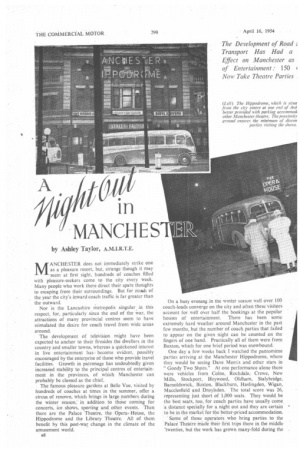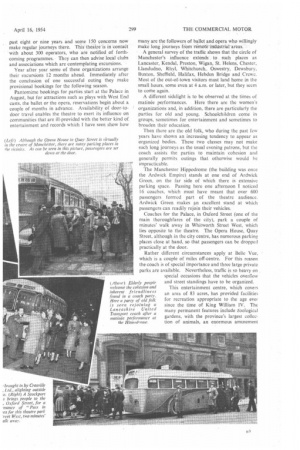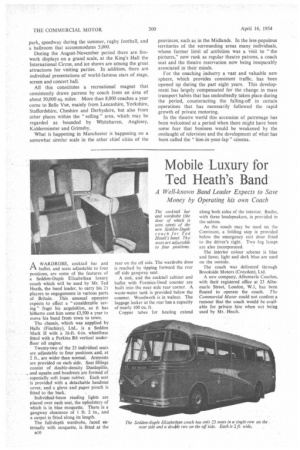by Ashley Taylor, A.M.I.R.T.E.
Page 42

Page 43

Page 44

If you've noticed an error in this article please click here to report it so we can fix it.
MANCHESTER does not immediately strike one as a pleasure resort, but, strange though it may seem at first sight, hundreds of coaches filled with pleasure-seekers come to the city every week. Many people who work there direct their spare thoughts to escaping from their surroundings. But for much of the year the city's inward coach traffic is far greater than
the outward. .
Nor is the Lancashire metropolis singular. in this respect, for, particularly since the end of the war, the attractions of many provincial centres seem to have stimulated the desire for coach travel from wide areas around.
The development of television might have been expected to anchor to their firesides the dwellers in the country and smaller towns, whereas a quickened interest in live entertainment has I become evident, possibly encouraged by the enterprise of those who provide travel facilities. Growth in patronage has undoubtedly given increased stability to the principal centres of entertainment in the provinces, of which Manchester can probably be classed as the chief.
The famous pleasure gardens at Belle Vue, visited by hundreds of coaches at times in the summer, offer a circus of renown, which brings in large numbers during the winter season, in addition to those coming for concerts, ice shows, sporting and other events. Then there are the Palace Theatre, the Opera. House, the Hippodrome and the Library Theatre. All of them benefit by this post-war change in the climate of the amusement world.
it8
On a busy evening in the winter season well over 100 coach-loads converge on the city and often -these-visitors account for well over half the bookings at the popular houses of entertainment. There has been some extremely hard weather around Manchester in the past few months, but the number of coach parties that failed to appear on the given night can be counted on the fingers of one hand. Practically all of them were from Buxton, which for one brief period was snowbound.
One day a few weeks back I watched the pantomime partie3 arriving at the Manchester Hippodrome, where they would be seeing Dave Morris and other stars in 'Goody Two Shoes." At one performance alone there were vehicles from Colne, Rochdale, Crewe, New Mills, Stockport, Heywood, Oldham, Stalybridge, Barnoldswick, Buxton, Blackburn, Haslingden, Wigan, Macclesfield and Droylsden. The total score was 26, representing just short of 1,000 seats. They would be the best seats, too, for coach parties have usually come.
a distance speCially for a night out and they are certain • . to be in the market for the better-priced accommodation.
Some of those operators who bring parties to the Palace Theatre made their first trips there in the middle 'twenties, but the work has grown many-fold during the
past eight or nine years and some 150 concerns now make regular journeys there. This theairels in.contaet with about 300 operators, who are notified of forthcoming programmes. They can then advise local clubs and associations which are contemplating excursions. •
Year after year some of these organizations arrange their excursions 12 months ahead. Immediately after the conclusion of one successful outing they make provisional bookings for the following season.
Pantomime bookings for parties start at the Palace in August, but for attractions such as plays with West End casts, the ballet or the opera, reservations begin about a couple of months in advance. Availability of door-todoor travel enables the theatre to exert its influence on communities that are ill-provided with the better kind of entertainment and records which I have seen show how
many are the followers of ballet and opera who willingly make long journeys fibril Tirneett'intlostrial-areas. A general survey of the traffic shows that the circle of Manchester's influence extends to such places as Lancaster, Kendal, Preston, Wigan, St. Helens, Chester, Llandudno, Rhyl, Whitchurch, Oswestry, Dewsbury, Buxton, Sheffield, Halifax, Hebden Bridge and Crewe. Most of the out-of-town visitors must land home in the small hours, some even at 4 a.m, or later, but they seem to come again.
A different sidelight is to be observed at the times of matinee performances. Here there are the women's organizations and, in addition, there are particularly the parties for old and young. Schoolchildren come in groups, sometimes for entertainment and sometimes to broaden their education.
Then there are the old folk, who during the past few years have shown an increasing tendency to appear as organized bodies. These two classes may not make such long journeys as the usual evening patrons, but the coach assists the parties to maintain cohesion and generally permits outings that othenvise would be impracticable.
The Manchester Hippodrome (the building was once the Ardwick Empire) stands at one end of Ardwick Green, on the far side of which there is extensive parking space. Passing here one afternoon I noticed 16 coaches, which must have meant that over 600 passengers formed part of the theatre audience. Ardwick Green makes an excellent stand at which passengers can readily rejoin their vehicles.
Coaches for the Palace, in Oxford Street (one of the main thoroughfares of the city), park a couple of minutes' walk away in Whitworth Street West, which lies opposite to the theatre. The Opera House, Quay Street, although in the city centre, has numerous parking places close at hand, so that passengers can be dropped practically at the door.
Rather different circumstances apply at Belle Vue, which is a couple of miles off-centre. For this reason the coach is of special importance and three large private parks are available. Nevertheless, traffic is so heavy on special occasions that the vehicles overflow and street standings have to be organized.
This entertainment centre, which covers an area of 83 acres, has provided facilities for recreation appropriate to the age ever since the time of King William IV. The many permanent features include Zoological gardens, with the province's largest collection of animals, an enormous amusement
park, speedway during the summer, rugby football, and a ballroom that accommodates 5,000.
During the August-November period there are firework displays on a grand scale, at the King's Hall the International Circus, and ice shows are among the great attractions for visiting parties. In addition, there are individual presentations of world-famous stars of stage, screen and concert hall.
All this constitutes a recreational magnet that consistently draws patrons by coach from an area of about 30,000 sq. miles. More than 8,000 coaches a year come to Belle Vue, mainly from Lancashire, Yorkshire, Staffordshire, Cheshire and Derbyshire, but also from other places within the " selling " area, which may be regarded as bounded by Whitehaven, Anglesey, K idderminster and Grimsby.
What is happening in Manchester is happening on a somewhat similar scale in the other chief cities of the provinces, such as in the Midlands. In the less-populous territories of the surrounding areas many individuals, whose former limit of ambition was a visit to "the pictures," now rank as regular theatre patrons, a coach seat and the theatre reservation now being inseparably associated in their minds.
For the coaching industry a vast and valuable new sphere, which provides consistent traffic, has been opened up during the past eight years. This development has largely compensated for the change in mass transport habits that has undoubtedly taken place during the period, counteracting the falling-off in certain operations that has necessarily followed the rapid growth of private motoring.
In the theatre world this accession of patronage has been welcomed at a period when there might have been some fear that business would be weakened by the onslaught of television and the development of what has been called the " lion-in-your-lap " cinema.




















































































